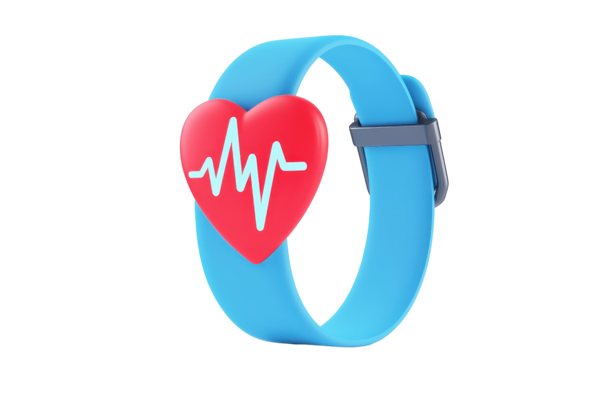Your heartbeat is one of the most telling indicators of your overall health. Monitoring it regularly can offer insights into your cardiovascular well-being and help you take timely action if something seems amiss.
But how do you know if your heart rate is within the normal range? And what is considered a dangerous heart rate? Let’s explore some simple yet effective checks to ensure your heart stays healthy.
Understanding the Basics of Heart Rate
The term normal heart rate refers to the number of times your heart beats per minute while at rest. A resting heart rate for adults ranges between 60 to 100 beats per minute.
However, age, fitness levels, and stress can influence your pulse. While a heart rate lower than 60 beats per minute may be normal for athletes, it might indicate a problem for others. Similarly, a rate exceeding 100 beats per minute during rest could signal an underlying condition.
Regularly checking your pulse can detect anomalies early and prompt a healthcare professional’s consultation. This simple practice, combined with understanding what constitutes a normal pulse rate, can significantly improve your ability to monitor your heart health.
When Should You Be Concerned?
Knowing the difference between a healthy heart rate and a potentially dangerous one is crucial. A heart rate that’s too fast (tachycardia) or too slow (bradycardia) could lead to complications such as dizziness, fatigue, or even fainting. If you experience any of these symptoms, it’s essential to check your heart health immediately and seek medical advice.

Factors Affecting Heart Rate
Several variables can influence your heart rate, including:
- Physical Activity: Exercise elevates your heart rate temporarily, which is normal. Over time, regular physical activity can lower your resting heart rate as your heart becomes more efficient.
- Stress Levels: Emotional stress or anxiety can cause your heart to beat faster than usual.
- Medications: Certain medications, such as beta-blockers, can slow down your heart rate, while others, like decongestants, may increase it.
- Medical Conditions: Issues like thyroid disorders, anemia, or infections can also impact your heart rate.
When to See a Doctor
If you notice consistent irregularities in your heart rate or experience symptoms like chest pain, shortness of breath, or fainting, it’s essential to seek medical attention. Institutions known for their exceptional cardiac care, such as the best hospital in Gurugram, can offer specialized evaluations and treatments.
How to Check Your Heart Rate
Monitoring your pulse is simple and can be done using just your fingers and a stopwatch. Here’s how:
- Place your index and middle fingers on your wrist or the side of your neck.
- Press lightly until you feel your pulse.
- Count the number of beats in 60 seconds, or count for 30 seconds and multiply by two.
Alternatively, fitness trackers and smartwatches can provide real-time heart rate data, making it easier to monitor your numbers throughout the day.
Promoting a Healthy Heart Rate
Maintaining a healthy heart rate involves a combination of lifestyle changes and regular monitoring. Here are some tips:
- Stay Active: Engage in regular physical activity such as walking, swimming, or yoga.
- Eat Heart-Healthy Foods: Incorporate more fruits, vegetables, whole grains, and lean proteins into your diet.
- Stay Hydrated: Dehydration can cause your heart to work harder, increasing your heart rate.
- Manage Stress: Practices like meditation, deep breathing, and mindfulness can help keep your heart rate in check.
- Quit Smoking and Limit Alcohol: Both can adversely affect your cardiovascular health over time.
Signs of a Strong Heart
A strong and healthy heart doesn’t just maintain a steady beat; it supports your body during physical activity and recovers quickly afterward. Indicators of good heart health include:
- A lower resting heart rate.
- The ability to engage in moderate to intense physical activity without discomfort.
- Quick recovery to a normal heart rate post-exercise.
Common Myths About Heart Rate
Several misconceptions surround heart rate. Some believe that a lower heart rate is always better, which is not true for everyone. Others think that occasional fluctuations are a cause for alarm, but these can often be attributed to temporary factors like stress or caffeine intake. Understanding these myths can help you better assess your heart’s condition.
Conclusion
Your heart works tirelessly to keep you alive, and understanding its rhythm is a vital part of staying healthy. By recognizing what constitutes a normal heart rate for adults and taking proactive steps to maintain it, you can significantly reduce your risk of cardiovascular issues. Simple actions like checking your pulse, adopting a heart-healthy lifestyle, and consulting professionals when needed can make all the difference.
Monitoring your heart rate improves your physical health and gives you peace of mind. With regular checks and healthy habits, you can keep your heart in great shape and enjoy a fulfilling life.
Are you ready to take charge of your heart health? Start today by implementing these small yet impactful changes and ensure your heart keeps beating strong. For more information and expert guidance, reach out to a trusted healthcare provider.
You may also like
-
Scalp Micropigmentation: Transforming Lives One Hairline at a Time
-
A Beginner’s Guide to Acupuncture: Tools, Techniques and Safety Tips
-
The Emotional Impact of a Mommy Makeover: Rediscovering Confidence Inside and Out
-
How to Read a Peptide Certificate of Analysis (CoA) for Research
-
Refresh Your Face with Juvederm

